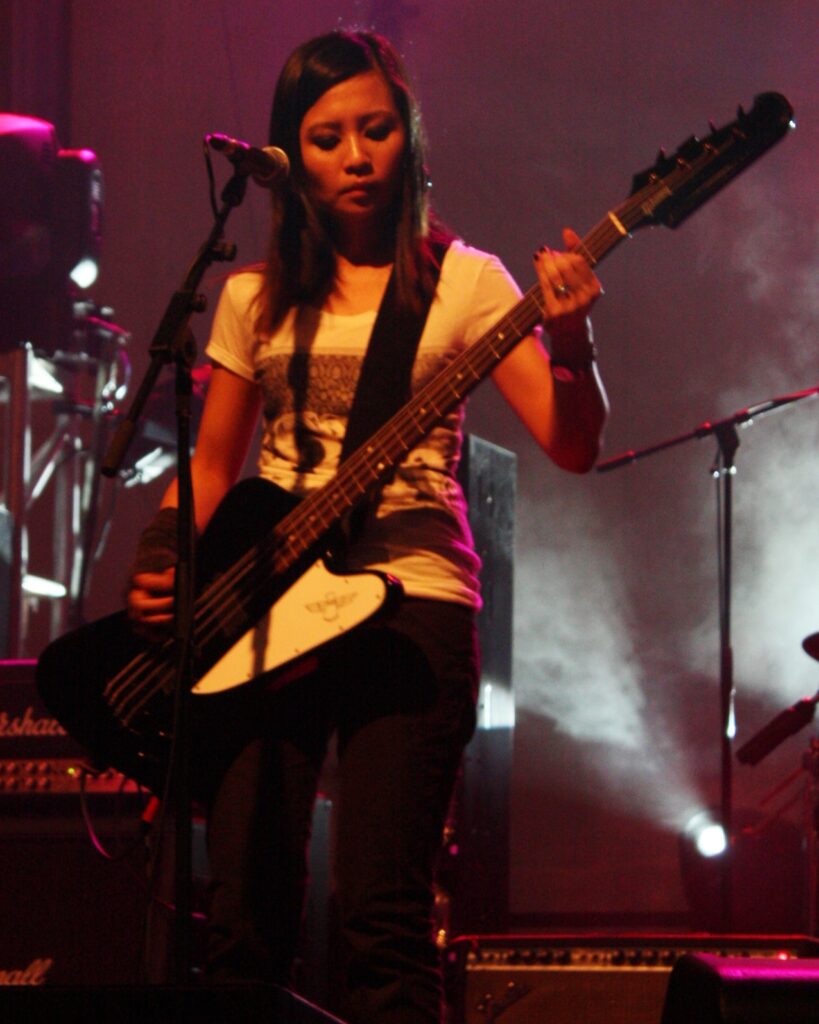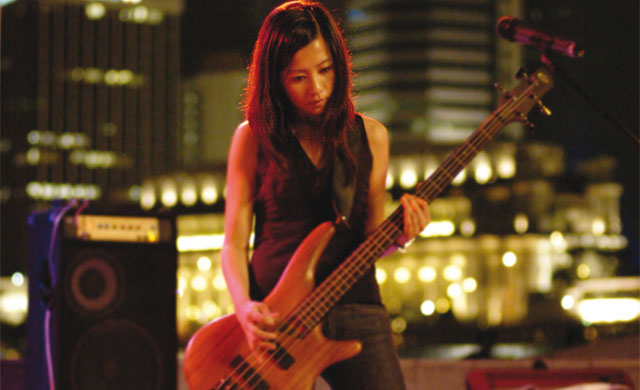(Editor’s Note: This interview with musician and singer Linda Ong was conducted by Amy Goh for the now-defunct website Eyestrane.com, where Amy was an occasional contributor. It was originally published in March of 2012 at Eyestrane and it’s been republished at Idol Features courtesy of Eyestrane editor-in-chief, Tom Heckbert, with a thanks going out to Amy.)
 Lunarin consists of an Unholy Trinity of Linda Ong, Ho Kah Wye, and Loo Eng Teck. They have been playing together for more than 15 years.
Lunarin consists of an Unholy Trinity of Linda Ong, Ho Kah Wye, and Loo Eng Teck. They have been playing together for more than 15 years.
Initially inspired by grunge bands such as Alice in Chains and Soundgarden, the Unholy Trinity has since expanded their musical horizons to create a soundscape reminiscent of the progressive art-rock/heavy metal stylings of Tool, A Perfect Circle, and Mastodon, coupled with the lyrical sensitivities of PJ Harvey and Tori Amos.
When not busy banging out heavy art rock riffs in a hope to shock people, the trio holds professional day jobs, in line with their ongoing roles as double-agents for the underground.
EYESTRANE: Hi Linda, thanks for giving me the opportunity to interview you. I have been a fan of yours since a friend introduced me to your music when I was still in high school. I think you were one of the first acts I ever caught live. Thank you! When was this? As a young, emotionally fraught artist obsessed with the potency of mythic stories and the power of words, your brew of mythic prog-rock immediately captivated me. May I began by asking you what initially drew you to music as a form of self-expression? I hear you have little or no musical training.
 LINDA ONG: I’ve had a love for music since I was a child. I grew up in a household where my mother was always singing and the radio would always be switched. I was told that as toddler I was already making up my own tunes and singing my own melodies. I was quite a drama queen! As I grew older, my love for music resonated even more deeply with me. I was a shy and awkward adolescent. I had very little friends, so music became a close confidant. There would always be a song that had the lyrics that said the things I wanted to say; with melodies that resonated with the emotions that I was feeling and wanted to express. I remember lying in bed with my (self-induced) adolescent sorrow, listening to music for hours on end and not doing anything else. I believed, back then, that music saved my life. Because I felt and believed in music so intensely, it felt natural that I would choose music as an avenue of self-expression when the opportunity presented itself to me. I took that opportunity, not knowing where it would lead me or how long the journey would take. Little did I imagine that the journey would still be ongoing now!
LINDA ONG: I’ve had a love for music since I was a child. I grew up in a household where my mother was always singing and the radio would always be switched. I was told that as toddler I was already making up my own tunes and singing my own melodies. I was quite a drama queen! As I grew older, my love for music resonated even more deeply with me. I was a shy and awkward adolescent. I had very little friends, so music became a close confidant. There would always be a song that had the lyrics that said the things I wanted to say; with melodies that resonated with the emotions that I was feeling and wanted to express. I remember lying in bed with my (self-induced) adolescent sorrow, listening to music for hours on end and not doing anything else. I believed, back then, that music saved my life. Because I felt and believed in music so intensely, it felt natural that I would choose music as an avenue of self-expression when the opportunity presented itself to me. I took that opportunity, not knowing where it would lead me or how long the journey would take. Little did I imagine that the journey would still be ongoing now!
EYESTRANE: Lunarin plays a very unique brand of art rock that reminds me of A Perfect Circle meets Tori Amos, with a mythic spin. May I ask what drew you into this particular brand of music?
LINDA: The lazy answer would be that all three of us are big fans of A Perfect Circle and Tori Amos. But I think the true answer lies in explaining why we are all collectively fans of A Perfect Circle and Tori Amos to begin with.
The three of us are very different people and our musical tastes are extremely divergent. For some reason however, the three of us are drawn to music that have classical roots, have grand movements, soaring harmonies and beautiful melodies. It is not something we planned, but that appears to be the common denominator when it comes to deciding on music that all three of us can agree on. In fact, it is because of this common denominator that I think there are far more similarities between Tool, A Perfect Circle (even Alice in Chains) with Tori Amos than few people would realize, and is the reason why we are such big fans of these artistes.
EYESTRANE: Your material often draws inspiration from mythic and literary sources: Midas, Ligeia, Ariel, Medusa. What role do these figures play within your music lyrically and musically? How do they inform the songwriting process?
LINDA: My interest in going back to mythology coincided with the demise of our previous band Fuzzbox and the inception of Lunarin. At that time, because of Fuzzbox, we were disillusioned with being in a band and with songwriting. It was a malaise that was infecting all aspects of our creativity. To address this, I felt a need to return to basics, to strip away the excesses of being in a band; and to focus on songwriting as being our primary endeavour above all else. In doing so, I found great inspiration in going back to the great mythologies. It was comforting to be reminded that for thousands of years, the archetypes that make up the stories that we tell, the poetry that we write and the songs that we sing have remained immutable.
My own take on this is that human civilization hasn’t changed much since ancient times – we have just found a way to do things quicker and easier thanks to advances in science – but basic human emotions, needs and desires that make up the archetypes have remained unchanged throughout the centuries. We all want to be loved; we all see and crave beauty; we desire respect and devotion; we understand the gravity of hurt, loss and defeat. In order to create true, uncontrived art (and this should not just be limited to music but also to visual art such as yours; and poetry and literature), one must harness the powers of mythology in order to be a truly inspired storyteller. You must cancel yourself out of the equation (you are just a mere conduit) and allow the idea to come forth in the most natural way that you could possibly express, with your limited capabilities. There was a time when I used to tell people that this quest to achieve pure inspired art is almost akin to Plato’s theory of forms! I became quite obsessed with this and raised a few eyebrows when I tried to explain this during interviews. Personally though, this revelation became a liberating experience for me as a songwriter. I was no longer restricted to music or aping other bands in my quest to source for inspiration. Instead I was reading books and watching films. I was getting inspiration for song lyrics from a short story that I had read instead of the latest rock song that was climbing up the charts. The sources of ideas were infinite. Have I done a good enough job expressing these ideas that I have found? Honestly, no. But I will keep trying because I believe this is the right path.
EYESTRANE: Lunarin recently released an acoustic record called “The Midas Sessions”. I love the way your voice interweaves into your threadbare melodies in a way that I can only describe as cathartic. What was the impetus for doing acoustic renditions of your usually musically dense songs?
LINDA: The album wasn’t the result of some grand master plan. We never really planned to release a full length album. We had an acoustic jam session with our friend Natalie (violins) and my brother Victor (cello) and were excited by how good the songs sounded when stripped bare and given a classical treatment. We therefore thought it would be a waste not to record these songs. The original plan was to release a short EP. We started throwing in more songs and the project snowballed into a full length album.
EYESTRANE: You have a unique voice that somehow calls to mind the sirens of Greek myth. Do you think of your vocals as a separate instrument within your music?
LINDA: Thank you. I however do not think I have the power to lure sailors to shipwreck, much as I hope I could! I struggled with my vocals in the early days of Lunarin because everyone thought I couldn’t sing and hated the sound of my voice. It took me a lot of work to be as confident about it as I am with it now. That’s why laying down the various vocal overdubs for The Midas Sessions was a form of catharsis for me. It enabled me to experiment with the widest range of emotions with my singing, which I enjoyed immensely, without any pressure or fear. I have always regarded vocals as another instrument in a song. It should complement, not overwhelm, the other elements.
 EYESTRANE: Lunarin has been playing for quite awhile now! How have you seen your band develop since “The Chrysalis”?
EYESTRANE: Lunarin has been playing for quite awhile now! How have you seen your band develop since “The Chrysalis”?
LINDA: We are more experienced when it comes to the logistics of being in a band – we are more astute when it comes to matters relating to recording, planning an album, and doing live shows. Songwriting however, is still a mystery. There is no “secret method” to writing a song. Some days the songs come and some days they don’t. Being in a band longer doesn’t make the process easier.
EYESTRANE: What are your plans as a band for the future?
LINDA: We do not have any fixed concrete plans as yet. Right now the focus is to work on new songs. Whether or not that will lead to a new album remains to be seen. I like to think that the secret of our longevity is to have no plans!
EYESTRANE: You are both a lawyer and a musician. I had a brief conversation with a professor of mine recently on how ‘Dionysian’ art-making and ‘Apollonian’ intellectual processes are often thought of as antipodes. Personally, I see them as continually in tension; the presence of both pushes me to create more. I imagine it is very different for you, however, being a full-time lawyer. What is it like managing such disparate roles in real life? Do you see them as conflicting or reconcilable?
LINDA: I agree with you. I do not think art making and intellectual processes are antipodes. Even though there are times when I wish I could quit my job and focus on music full time, I also believe that when that time comes, I wouldn’t know what to do with myself. You hit the nail exactly on the head when you mentioned the tension between art making and the use of intellectual processes – because of the strife I encounter at work, the grievances I have witnessed and the ugliness I have seen in the day, I feel inclined to create and fall back to the beauty of art at night. My desire for beauty is sustained by my knowledge of the constant existence of the grotesque.
 EYESTRANE: Were there any humorous instances you’re willing to share in which these two parts of your life collided?
EYESTRANE: Were there any humorous instances you’re willing to share in which these two parts of your life collided?
LINDA: Well, I have had opponents in court suddenly becoming very nice to me after they found out I play in a band. I don’t know why. I have also sold one copy of my CD to a fellow lawyer in court when he requested it. I don’t know if he enjoyed it though.
EYESTRANE: You’re in a band with two other male members. What is like being the only female member of such a long-standing band?
LINDA: It is not an issue. They have long since forgotten I am female!
EYESTRANE: I heard that you had a recent solo show at Esplanade. What was it like playing solo for a change? Any plans on releasing a record as a solo artist?
LINDA: Playing solo is nerve-wrecking. I am never nervous when I play with the band, but I feel the pressure when I do a set alone. That said, I had a lot of fun with my last gig at the Esplanade and I don’t rule out the possibility of doing another one if the opportunity arises. I have some solo material. Not enough to release an album yet but we’ll see.
EYESTRANE: I really liked your renditions of old Fuzzbox songs, particularly “Dead White Butterflies.” Any plans at reworking any of your older material from your first band?
LINDA: Thank you. Unfortunately no, we revisit old material more for nostalgia than anything else. We are a band that doesn’t enjoy revisiting back catalogs. Our focus is always to write new material.
EYESTRANE: How do you envision the future for other Singaporean musicians? Do you think that there is a living to be made out of music in Singapore?
LINDA: At this point in time, no. But bit by bit we are gaining greater acceptance by the general public. We can only hope that in time we can have a vibrant and sustainable music industry.
EYESTRANE: Any final words, or perhaps music you’d recommend to our readers?
LINDA: You should check out (the band) Hanging Up the Moon and the new Aspidistrafly album. Beautiful stuff coming out from Singapore that we all should be proud of.
About the author
The now-defunct website Eyestrane.com featured many interviews with some very notable ladies. Since said interviews were too good to go unseen after the site was shut down in August of 2014, former Eyestrane editor-in-chief Tom Heckbert has graciously agreed to occasionally resurrect some from his archived files for republication here at Idol Features. Tom and his former staff at Eyestrane always maintained a deep respect for the talent and creativity of the people they interviewed for the site.










Thanks for reviving this interview. This was before Linda had her kids. She now has two. I was a big fan, but haven’t thought about Linda or Lunarin since their “Into the Ether” album a few years ago. I thought they had broken up, but I see they released an album in 2021.